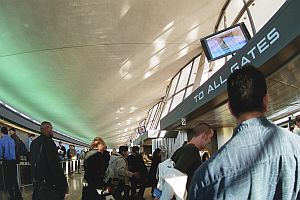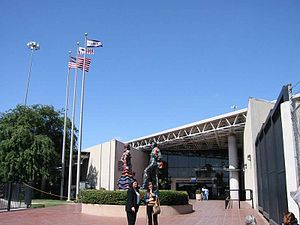Washington - Last week, Customs and Border Protection (CBP) quietly implemented a new program. Designed to help the agency catch anyone travelling under a false passport, the Apex Air Entry and Exit Re-Engineering (AEER) Project was installed in Washington's Dulles airport. As creepy as it sounds, the "re-engineering" experiment takes photos of travelers and uses facial recognition software to see if the face matches the passport photo.
Civil liberties activists have already expressed their concerns.
"Here we have a program where individuals are not suspected of wrongdoing and are engaged in routine behavior," Jake Laperruque, fellow at the Center for Democracy and Technology, told Motherboard. "And they are being required to submit a piece of biometric data that could identify them later and that's going to be retained."
 |
While the Dulles facial recognition program could target pretty much everyone entering the country through the capital's major airport, the other procedures will focus largely on the movement of foreigners through airports and the US-Mexico border.
The second program is named the Biometric Exit Mobile Experiment, and is designed to "confirm with certainty that a foreign traveler has departed the United States." Using what will likely be a fingerprint scanner, CBP officers at the Atlanta Hartsfield-Jackson International Airport will begin monitoring the movement of any foreign nationals leaving the country. Comparing the exit data with entry statistics, the CBP will see if an individual has overstayed their welcome.
 |
If these experiments prove efficient, Homeland Security could implement them on a broader scale, setting up biometric scanners in all major airports and border stations. The third experiment, in particular, could be advanced as a more practical solution to the country's ever-present border concerns.
This would effectively allow the government to record the personal, biological data of every person entering and leaving the United States.
The CBP has already made assurances that the Dulles airport experiment will address privacy concerns in regards to the data it collects.
Since the program was opened to the general public more than 800,000 travellers have been enrolled and as part of the push to boost enrollment the TSA has brought the number of its enrollment centers to over 300 locations.
"The technology is a stand-alone system and will not communicate with any other parties, databases, or systems," a CBP spokesperson told Motherboard. "CBP remains committed to protecting the privacy of all travelers."
But this is little comfort to privacy advocates already wary of the governments domestic spying apparatus after the revelations of Edward Snowden.
"Today, it's testing at the border, tomorrow it could be facial recognition deployed in public places," Dave Maass, of the Electronic Frontier Foundation, told Motherboard. "Today, the photos taken are being kept segregated from other departments and agencies, tomorrow they could be shared for a whole host of other purposes."
Original article


